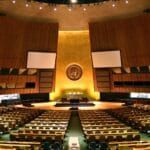Contending with the new “radioactive patriotism”
By Joshua Pollack | July 20, 2010
A few weeks ago, it seemed as if the nuclear arms control and nonproliferation communities had any number of new reasons for optimism. April brought the New START treaty, the Nuclear Posture Review, and the 47-nation Nuclear Security Summit in Washington, D.C. The 2010 Nuclear Non-Proliferation Treaty (NPT) Review Conference concluded in May with a hard-won consensus. Finally, in early June, the U.N. Security Council defied the skeptics by adopting a new resolution to penalize Iran for noncompliance with nuclear safeguards — the first such action in more than two years.
Ripples from Iran’s fuel-cycle activities are being felt across the Middle East, and nowhere is the nonproliferation regime more at risk.
But other recent developments have exposed the limits of some of this spring’s achievements. Progress toward ending the production of fissile material — the plutonium or highly enriched uranium (HEU) that forms the cores of nuclear weapons — has faltered, along with momentum toward blocking the spread of fissile material production technologies. In most parts of the world, in fact, these trends seem to be moving in the wrong direction. While it’s too soon to despair, it’s never too early to take stock, and to consider how governments, starting with the one in Washington, D.C., might address the problems of fissile-material control.
The picture may be darkest in South Asia, where the world’s only ongoing nuclear arms race has begun to accelerate. Pakistan is currently adding to its fleet of plutonium-production reactors, while India appears to be expanding its main uranium enrichment facility. These steps will allow both states to enlarge their nuclear arsenals at a faster pace. Pakistan has even moved to block negotiations toward a long-awaited treaty to end the worldwide production of fissile material for nuclear weapons.
Compounding South Asia’s problems is an erosion of the norm against nuclear commerce with states outside the nonproliferation regime. China now appears poised to move forward with the sale of two new nuclear power reactors to Pakistan, heedless of the export guidelines that Beijing accepted upon joining the Nuclear Suppliers Group (NSG) in 2004. As in the case of India — which received a formal exemption from NSG guidelines in 2008 — receiving new nuclear supplies from abroad will diminish whatever incentives Pakistan might have to reconsider its military nuclear program. (The only other countries remaining outside of the regime — Israel and North Korea — are not likely to receive similar nuclear supply offers.)
Attempts to strengthen the export rules have stumbled in the face of growing opposition. A number of countries have begun to perceive access to sensitive nuclear fuel cycle technologies as a symbol of international stature. At a late June NSG meeting in New Zealand, South African and Turkish representatives blocked an attempt to adopt a new guideline against the transfer of enrichment or reprocessing technology to countries currently without them. Afterward, leading expert Mark Hibbs described the proposal as “unacceptable to Turkey on grounds of principle.”
Unfortunately, what might be called the new radioactive patriotism is already a global phenomenon. The undercurrent of suspicion and resentment that greeted a newly opened international fuel bank is a sign of the times; rather than welcome the consistent availability of nuclear fuel for an anticipated wave of new nuclear power reactors, a number of countries fear that it will be used to deny them access to a technological status marker.
The backlash has now reached South Korea, an advanced country whose nuclear industry is in high demand as an exporter. Sometimes citing waste disposal and economic concerns, and sometimes referencing North Korea’s nuclear tests, some South Korean political figures have called for an assertion of “nuclear sovereignty” through a novel reprocessing technique called pyroprocessing. It’s hard to avoid the impression that the idea mainly provides a way for South Korea to “catch up” with Japan, the only non-nuclear weapon state with a large stockpile of plutonium.
In principle, of course, if a variety of states wish to pursue vanity fissile-material projects, from pyroprocessing to making HEU fuel for naval reactors, then international safeguards should suffice to reassure their neighbors that these undertakings are peaceful. The deeper problem may be the bad precedents these choices make available to countries like Iran, Syria, and possibly Burma, with histories of concealing work on the nuclear fuel cycle and poor records of cooperation with safeguards inspectors. Iran has already seized on South Korea’s rationales for pyroprocessing to start its own research. These activities are at the center of Iran’s latest dispute with the International Atomic Energy Agency (IAEA).
Ripples from Iran’s fuel-cycle activities are being felt across the Middle East, and nowhere is the nonproliferation regime more at risk. Even countries with little experience in nuclear technology, like Jordan and Saudi Arabia, have started talking about enriching uranium. Washington’s major success of 2009 — convincing the United Arab Emirates to forswear the acquisition of fuel-cycle technology in a legally binding agreement — has yet to be repeated elsewhere in the region.
Maged Abdelaziz, Egypt’s U.N. ambassador, named the stakes in an interview at the end of the NPT Review Conference. “We in Egypt are against even the presence of nuclear weapons in our region,” he told Global Security Newswire. “But if others will acquire nuclear weapons — and if others are going to use these nuclear weapons to acquire status in the region of the Middle East — let me tell you, we are not going to accept to be second-class citizens in the region of the Middle East.” Egypt is probably not the only country whose leaders feel this way.
On the positive side of the ledger, most of the countries now insisting on a right to acquire nuclear fuel-cycle technologies are not actually rushing out to do so. It is complex and expensive technology, and it is difficult to acquire without help. Nor will the world’s most advanced countries provide that help; in late June, they reaffirmed a commitment against transferring enrichment or reprocessing technology to countries without them.
But recognizing that the trend is moving in the wrong direction, those governments that are most committed to nonproliferation should gird their loins for a long struggle. Without a strong international consensus, these issues won’t be decided in bodies like the NSG or future NPT Review Conferences. Instead, the fight to stop the spread of enrichment and reprocessing will take place in bilateral relations between many countries over many years.
As a result, the single most constructive step that governments might take now is to elevate their nonproliferation bureaus to the high level of authority consistent with the importance of the issue to national and international security. For most of the Cold War and a decade afterward, the U.S. Arms Control and Disarmament Agency played this crucial role. When other bureaucracies may favor other priorities in dealing with partner countries, having an independent agency that can advocate for nonproliferation at the highest levels may make all the difference. Not doing so, over the long haul, could mean losing the fight for fissile-material control.
Together, we make the world safer.
The Bulletin elevates expert voices above the noise. But as an independent nonprofit organization, our operations depend on the support of readers like you. Help us continue to deliver quality journalism that holds leaders accountable. Your support of our work at any level is important. In return, we promise our coverage will be understandable, influential, vigilant, solution-oriented, and fair-minded. Together we can make a difference.
Topics: Columnists, Nuclear Weapons















